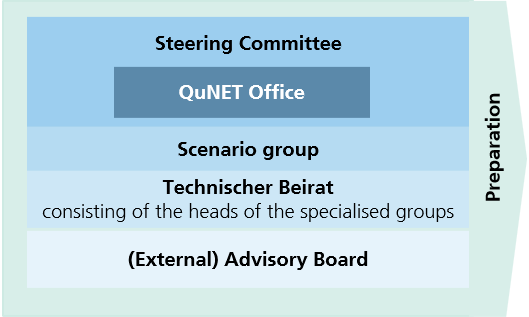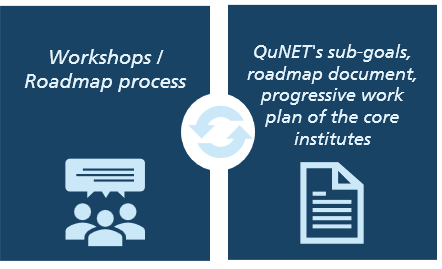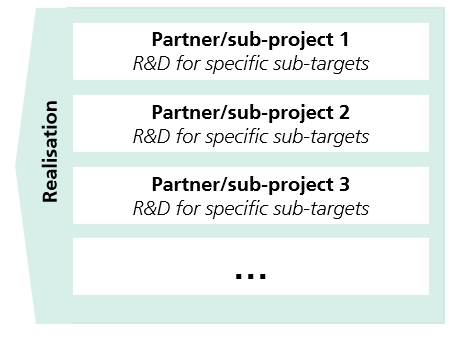Project structure of the QuNET initiative
economic-technical innovation ecosystem
Core institutes, industry, research institutions and users




Together, both sides work towards an agile process in which the (sub-)objectives of the QuNET initiative are constantly compared with the current state of research and development and, if necessary, adapted to changing requirements. This way, a continuous and fruitful adaptation of the QuNET initiative to new framework conditions should be possible at any time in the economic-technical innovation ecosystem. |
The central steering body of the QuNET initiative is the steering committee. It is made up of four representatives from the four core institutes and is responsible for the strategic development of the initiative. It is also in contact with relevant communities, institutions, users and the advisory boards. Thereby it always keeps an eye on the fields of application for quantum communication pursued by the initiative.
The QuNET steering committee includes:
- Andreas Tünnermann (Fraunhofer IOF), Koordinator/Vorsitzender
- Martin Schell (Fraunhofer HHI)
- Florian David (DLR-IKN)
- Gerd Leuchs (MPL)
The QuNET Office supports the steering committee and is based at the Fraunhofer IOF.
Furthermore, the steering committee is advised by a technical advisory board and the advisory board of the QuNET initiative.
To promote the scientific networking of the project partners, the participants are structured into topic-related specialist groups. These are listed below with their respective leaders:
- Free-beam systems (Florian Moll, DLR-IKN)
- Fiber-Systems (Nino Walenta, Fraunhofer HHI)
- Overall architrcture and safety aspects (Christoph Marquardt, MPL)
- Components and interfaces (Fabian Steinlechner, Fraunhofer IOF)
The QuNET specialist groups develop technologies and processes that are necessary to implement the QuNET objectives. Through cross-group collaboration, they ensure a continuous application focus. In this way, holistic solutions become possible.
The scenario group serves as an interface between the specialist groups, the steering committee and the planning of application scenarios for quantum communication. This way, it supports the adaptation of the scenarios to new topics and requirements. It also takes into consideration issues of certification, approval and standards.
The scenario group is made up of selected members of the five core institutes involved in QuNET as well as other well-networked project partners. Its chairman advises the steering committee and is appointed by it. The scenario group is also an interface to other European projects in the field of quantum communication, such as EuroQCI.
The current chair of the scenario group is Christoph Marquardt (MPL).
The advisory board is composed of members of the Federal Office for Information Security (BSI), national network operators, (sub)system developers, representatives of the security industry, experts in quantum repeater research (especially QR.X) as well as experts in satellite systems and (quantum) component developers. The advisory board supports the developments in order to constantly adapt them to the technical requirements of real and scalable quantum-safe communication systems. The advisory board is expanded as required.
Furthermore, a technical advisory board, consisting of the heads of the specialist groups, deals with technical decision-making principles.
The objectives of the QuNET initiative require extensive expertise in the field of quantum technologies. These go beyond the scientific and technical focuses of the five core institutes. For this reason, partners from science and industry are actively involved in the QuNET initiative. A significant proportion of the planned funding amount is reserved for newly affiliated joint research and development (R&D) projects. Flexible participation formats ensure the integration of further relevant players into the QuNET innovation ecosystem.
In order to ensure the transfer of research into operational products that can be used in industry, the German industry alliance for quantum security DIVQSec was also founded – in addition to and independently of the QuNET initiative. Its members network independently and seamlessly with QuNET’s scientific and technical innovation ecosystem. Together with QuNET, they want to promote the smooth transfer of research into industry and society.

